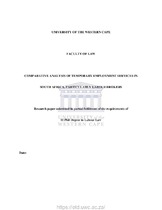| dc.description.abstract | In the early 1990s, South Africa (SA) entered its democratic transition, which created expectations of a dramatic turnaround in the country’s economy.1 The readmission of SA to the global arena introduced the economy to concepts such as globalisation. Globalisation came with some implications and impact that have been widely debated.2 The democratic transition brought a significant change to the job spectrum, generating an increase in Temporary Employment Service (TES) and a decrease in permanent employment.3 The reasons leading to this increase are that subcontracting is beneficial to employers in that this process results in the transferral of social risks to the subcontractor, reducing direct exposure to labour legislation.4 Regarding the pertinence of this issue, the Congress of South African Trade Unions (COSATU), the biggest union federation in the country, and the ruling party, the African National Congress (ANC), have long called for the elimination of labour brokers.5 COSATU, in its presentation to the Portfolio Committee on Labour in 2009, argued that labour brokers act as intermediaries to access jobs that allegedly exist, and which in many cases would have existed previously as permanent full time jobs.6 On the other hand, political organisations, such as the Democratic Alliance (DA), Congress of the People (COPE) and Business Unity South Africa (BUSA), have called for the regulation of labour brokers.7 These organisations argued that competition among businesses has increased over the past few decades. Therefore, in order to remain competitive, it is imperative to enhance technology and to adopt flexibility regarding human resource processes to minimise costs and to allow companies to broaden their investment based on the positive turnover that will occur. The continuing point of view of the opposition political coalitions has been to boost the corporate. | en_US |

